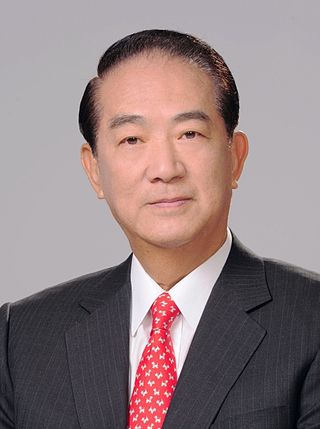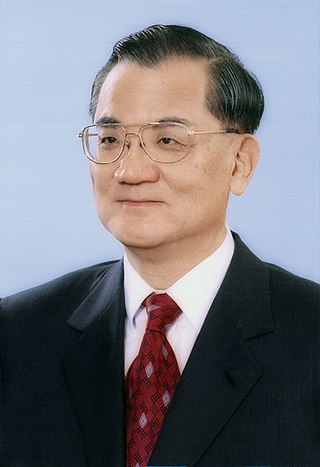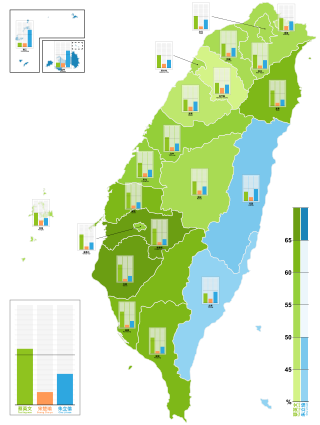
Taiwan, officially the Republic of China (ROC), is governed in a framework of a representative democratic republic under a five-power system first envisioned by Sun Yat-sen in 1906, whereby under the constitutional amendments, the President is head of state and the Premier is head of government, and of a multi-party system. Executive power is exercised by the Executive Yuan. Legislative power is vested primarily in the Legislative Yuan. The judiciary is independent of the executive and the legislature. In addition, the Examination Yuan is in charge of validating the qualification of civil servants, and the Control Yuan inspects, reviews, and audits the policies and operations of the government.

Chen Shui-bian is a Taiwanese former politician and lawyer who served as the 5th president of the Republic of China (Taiwan) from 2000 to 2008. Chen was the first president from the Democratic Progressive Party (DPP) which ended the Kuomintang's (KMT) 55 years of continuous rule in Taiwan. He is sometimes referred to by the nickname A-Bian (阿扁).

The pan-Blue coalition, pan-Blue force or pan-Blue groups is a political coalition in the Republic of China (Taiwan) consisting of the Kuomintang (KMT), People First Party (PFP), New Party (CNP), Non-Partisan Solidarity Union (NPSU), and Young China Party (YCP). The name comes from the party color of the Kuomintang.

The People First Party is a centrist or centre-right political party in Taiwan.

James Soong Chu-yu is a Taiwanese politician who is the founder and current Chairman of the People First Party. Soong was the first and only elected Governor of Taiwan Province from 1994 and 1998. He was a candidate in the 2000 presidential election, which he lost to Chen Shui-bian of the Democratic Progressive Party (DPP).

The Taiwan Solidarity Union (TSU) is a political party in Taiwan which advocates Taiwan independence, and is affiliated with the Taiwanese localization movement. It was officially founded on 12 August 2001 and is considered part of the Pan-Green Coalition. Unlike the Democratic Progressive Party, its larger companion party in the Pan-Green Coalition, the TSU actively campaigns for the creation of a de jure Republic of Taiwan. The future of the party is in doubt after the 2016 elections as the party failed to secure enough votes to be eligible for state funding.

Lien Chan is a Taiwanese politician. He was the Chairman of the Taiwan Provincial Government from 1990 to 1993, Premier of the Republic of China from 1993 to 1997, Vice President of the Republic of China from 1996 to 2000, and was the Chairman of the Kuomintang (KMT) from 2000 to 2005, apart from various ministerial posts he had also held. Lien ran for the President of the Republic of China on behalf of the Kuomintang twice in 2000 and 2004, but both lost to Chen Shui-bian of the Democratic Progressive Party. Upon his retirement as KMT Chairman in August 2005, he was given the title Honorary Chairman of KMT. He is highly credited after holding a groundbreaking visit to Mainland China in his capacity as the Chairman of the Kuomintang to meet with the General Secretary of the Chinese Communist Party Hu Jintao on 29 April 2005, the first meeting between the two party leaders after the end of Chinese Civil War in 1949, which subsequently helped thaw the long-stalled cross-strait relations.

Presidential elections were held in Taiwan on 20 March 2004. A consultative referendum took place on the same day regarding relations with the People's Republic of China.

Hsu Hsin-liang is a Taiwanese politician, formerly Chairman of the Democratic Progressive Party (DPP). He was a supporter of the Pan-Blue Coalition from 2000 to 2008 but then supported the DPP in the 2008 presidential election.

Wang Jin-pyng is a Taiwanese politician. He served as President of the Legislative Yuan from 1999 to 2016, which makes him Taiwan's longest-serving legislative speaker. Once a leading figure of the Kuomintang (KMT), Wang is considered to be soft-spoken and a conciliatory figure who has often brokered deals between the KMT and opposition DPP. Due to his longevity, experience and influence in political scene, he is a widely respected figure in Taiwanese politics. He was replaced by Democratic Progressive Party's Su Jia-chyuan as President of the Legislative Yuan after a decisive victory for the DPP in the 2016 election.

The 2004 Taiwanese legislative election was held on 11 December 2004. All 225 seats of the Legislative Yuan were up for election: 168 elected by single non-transferable vote, 41 elected through party-list Proportional representation, eight elected from overseas Chinese constituencies on the basis of the proportion of nationwide votes received by participating political parties, eight elected by popular vote among the aboriginal populations. Members served three-year terms beginning on 1 February 2005, and ending 31 January 2008. The next term served four years.

This is a timeline of the Republic of China.

The 2001 Taiwanese legislative election was held on 1 December 2001. All 225 seats of the Legislative Yuan were up for election: 168 elected by popular vote, 41 elected on the basis of the proportional representation based of the nationwide votes received by participating political parties, eight elected from overseas Chinese constituencies on the basis of the proportion of nationwide votes received by participating political parties, eight elected by popular vote among the Taiwanese aboriginal populations. Members served three year terms from February 1, 2002 to February 1, 2005.

The 2005 Pan–Blue visits to mainland China were a series of groundbreaking visits by delegations of the Kuomintang (KMT) and their allied Pan-Blue Coalition to mainland China. They were hailed as the highest level of exchange between the Chinese Communist Party and the Kuomintang since Chiang Kai-shek and Mao Zedong met in Chongqing, China on August 28, 1945.

Local elections were held in Taiwan on 3 December 2005 to elect magistrates of counties and mayors of cities, councillors in county/city councils and mayors of townships and cities, known as the three-in-one elections, on 10 June 2006 to elect representatives in township/city councils and village chiefs, on 9 December 2006 to elect mayors and councillors of special municipalities, and on 30 December 2006 to elect village chiefs in Taipei City.

Presidential elections were held in Taiwan on 14 January 2012. The election was held concurrently with legislative elections. It was the fifth direct election for the President of the Republic of China. Prior to 1996, the President was elected by the ROC's National Assembly and not directly by the people.
General elections were held in Taiwan, officially the Republic of China, on Saturday, 16 January 2016 to elect the 14th President and Vice President of the Republic of China, and all 113 members of the ninth Legislative Yuan:

Presidential elections were held in Taiwan on 16 January 2016. Democratic Progressive Party (DPP) candidate Tsai Ing-wen with her independent running mate Chen Chien-jen won over Eric Chu of the Kuomintang (KMT) and James Soong of the People First Party (PFP). Tsai became the first female president in Taiwan, as well as in the Chinese-speaking world.
Chen Horng-chi is a Taiwanese politician who served as a member National Assembly between 1992 and 1996, when he was seated to the Legislative Yuan. Shortly after stepping down from the legislature in 2002, Chen left the Kuomintang and joined the Taiwan Solidarity Union.
Fu Hsueh-peng is a Taiwanese politician.
























